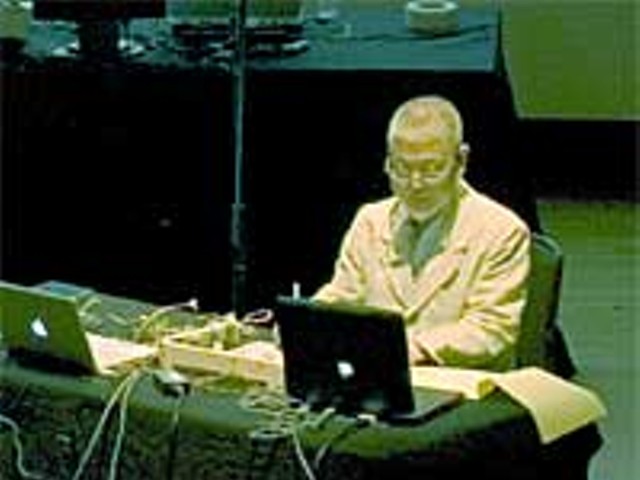Last Tuesday, DJ Houseshoes, DJ Dez, Slum Village's T3 and hundreds of others gathered at Northern Lights Lounge in Detroit to celebrate the release of producer J-Dilla's latest album, Donuts. It was Dilla's birthday. The next day, Houseshoes traveled to New York for a release party at Joe's Pub. Wajeed, of Platinum Pied Pipers, DJ'd, spinning Dilla music all night.
"I went to Fat Beats [a New York record store] to buy my copy," Houseshoes says. "Comin' out of the store, Wajeed called and said, 'He's gone.' I just sat down on the curb. I couldn't believe it."
The news came just that suddenly for most of us. The Detroit hip-hop community is numb.
Dilla, according to Houseshoes, a longtime friend, had been "in and out of hospitals for the last three years" contending with a kidney ailment. False rumors spread a year ago that he'd fallen into a coma. He hadn't, but he had been seriously ill and recently performed in Europe in a wheelchair. Last week he was apparently doing much better, but was tired of hospital visits.
Apparently, he died in sleep in a Los Angeles hospital. At press time it's said that his kidneys, or even lupus, played a role. He was 32.
Dilla's résumé has been reported by dozens of media outlets throughout the past week, but his true impact goes far beyond mere production credits.
If Detroit hip hop has a sound, James "Jay Dee/J-Dilla" Yancey defined it. Comparing him to hip-hop legends who achieved similar feats in their hometowns — Houston's DJ Screw or Brooklyn's Notorious B.I.G. — would be insufficient, though. Screw's chopped-and-screwed sound has made Houston the flavor of the month. But it's a regional flavor. Biggie is a Brooklyn benchmark, admired by the hip-hop world. But outside of Los Angeles' Gorilla Black, he's not imitated.
Yancey, who switched his moniker from Jay Dee to J-Dilla a few years ago, caused some of hip hop's best to literally change the way they make music. When Dilla was helping to develop Slum Village in the early '90s, he gave A Tribe Called Quest leader Q-Tip a beat tape. Hence, Dilla soon became the foundation of A Tribe Called Quest's production team, the Ummah. The results: The final two albums from A Tribe Called Quest, Beats, Rhymes & Life and The Love Movement, sounded very much like Slum Village projects. Q-Tip and Phife Dawg spent much of the album mimicking the rhyme styles of SV's T3 and Baatin.
Later, singer D'Angelo's Voodoo album likewise hit on Dilla's sound.
Producers Pharrell Williams, Kanye West and 9th Wonder have all said they changed the way they program drums after hearing Dilla's work. Pete Rock and Ahmir "?uestlove" Thompson conducted regular meetings of the minds with Dilla. Janet Jackson and Dianne Reeves benefited from his remixes.
Dilla always seemed to get deferred props. He is clearly lauded within hip-hop circles, and is, of course, huge overseas. But the American mainstream, conditioned by canned and formulaic radio rap, hardly batted a lash at genre-bending songs like Slum Village's "I Don't Know" or Pharcyde's "Runnin'."
Though he didn't give many interviews, Dilla granted Metro Times a Q&A in 1999 ("Sonic Rumbling," June 2, 1999). He acknowledged a desire for greater notoriety, but was also content with his workload, which included jobs for Bilal, Heavy D, Rah Digga, Mos Def and Common.
Dilla died as hip hop's van Gogh, recognized as a "genius" whose gift was an ability to breathe through his music. In a way, his quiet transition is appropriate. Much of the music world slept on him, so maybe he returned serve. Getting slept on hurts, doesn't it? What might hurt most is a point that Houseshoes makes: A huge chunk of hip hop's soul is gone.
Khary Kimani Turner is a freelance writer and musician. Send comments to [email protected]




